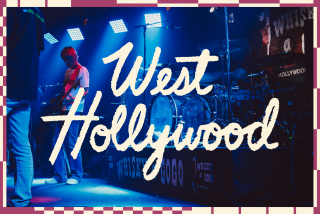Television review: When troubadours were the scene in L.A.
- Share via
“Troubadours: Carole King, James Taylor and the Rise of the Singer-Songwriter,” a presentation of “American Masters” that airs Wednesday on KOCE, tells the story of the crowd that haunted Doug Weston’s Troubadour in the late ‘60s and early ‘70s, the music they made, and (to a lesser extent) the mischief.
The film, which seems to be built backwards from the reunion concerts Taylor and King performed at the West Hollywood club to mark its 50th anniversary (and the subsequent arena tour they undertook last year), is not a complete picture of the genre, the age or the place. It’s a series of interlocking partial views that only suggest a whole, but the important bases are touched: the music, the sex, the drugs, the famous Monday Hoot nights, spotlight-loving owner Weston’s practice of signing artists to contracts that would bring them back to his stage after they were officially too big and expensive to play there.
“The mecca was the Troubadour,” says Steve Martin, who was there, “even though there was a club called the Mecca.” (Betty White and husband Allen Ludden once approached him in the bar: “We think you’re funny,” she said.) Martin is an amused voice of proportion: “We tended to view Laurel Canyon as the forest, but literally, really, it was one block from one of the heaviest trafficked streets in Los Angeles.” And: “How long can free love and pot exist as a cultural foundation? It can’t really.”
As former L.A. Times pop critic Robert Hilburn describes it here, the singer-songwriters provided a soundtrack for the wound-licking that came as Flower Power collapsed and the war went on. As untroubled as it could sometimes sound, there was a streak of dread running through much of this music, and it keeps “Troubadours” from devolving into an occasion for generational self-celebration. Even King’s “You’ve Got a Friend,” which Taylor among legions covered and which sounds as if it were written to be sung by all the children of the world holding hands in a circle, has a dark cloud floating over its assurances. And in both his songwriting and his self, the reticent Taylor — whose background includes mental institutions and heroin addiction — betrays an uneasiness that never entirely disappears into the well-wrought music that cradles it. “I don’t remember much about how I wrote those songs,” he says. “You just pretended you could play the guitar and then maybe you could, then you pretended you could write a song and maybe you could.”
Robert Christgau, long the lead critic at the Village Voice, appears as the voice of East Coast disdain for West Coast musical values (“fey ... detached ... casual cool arrogance”), though he is set up mainly to be knocked down. “We just always thought it was because they were cold, starving and jealous in New York,” says songwriter J.D. Souther of their critics. Adds guitarist Danny Kortchmar: “The music always wins.” “Troubadours” backs him up.
More to Read
The complete guide to home viewing
Get Screen Gab for everything about the TV shows and streaming movies everyone’s talking about.
You may occasionally receive promotional content from the Los Angeles Times.







